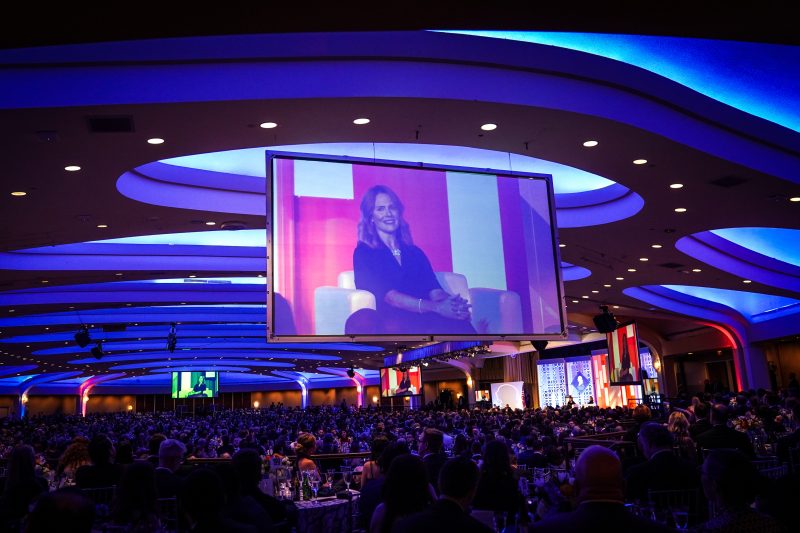
Justice Barrett gets standing ovation at Federalist Society gala

Justice Amy Coney Barrett received a standing ovation Thursday night at a black-tie gala for the Federalist Society, the conservative legal group that played a key role in her 2020 nomination and in helping former president Donald Trump transform the federal judiciary.
Outside the Washington Hilton ballroom, protesters dressed in black judicial robes called on the Supreme Court to strengthen its ethics policies after reports that some justices failed to disclose lavish travel and gifts from wealthy benefactors. One wore a T-shirt with the message: “SCOTUS is not for sale.”
Hours earlier, the Senate Judiciary Committee began debating the authorization of a pair of subpoenas, including for one of the Federalist Society’s longtime leaders, Leonard Leo, who attended the gala. Democrats and transparency advocates have been pressuring the high court to adopt more stringent disclosure and recusal rules and say they need more information about free private jet trips and vacations provided to Justices Clarence Thomas and Samuel A. Alito Jr.
The committee postponed a vote on the subpoenas after pushback from Republican lawmakers, who say the scrutiny of the two conservative justices is politically motivated and designed to undermine the court’s conservative supermajority.
The Federalist Society, founded in the 1980s, has had a hand in backing all six of the sitting conservative justices, starting with Chief Justice John G. Roberts Jr. But it was during the Trump administration that the group’s influence grew with Leo acting as Trump’s unofficial judicial adviser to fill the courts with judges who take an originalist approach to interpreting the Constitution and also stick closely to the text of statutes.
Conservative justices have long attended the event and dinner now named for the late Justice Antonin Scalia, just as some liberal justices, including Sonia Sotomayor, have been featured at events hosted by progressive organizations such as the American Constitution Society.
Barrett was the last of the three justices nominated by Trump to headline the gala. On Thursday, she spoke before a crowd of more than 2,500 judges, lawyers and conservative activists, many dressed in gowns and tuxedos. She was joined at the dinner of striped bass and filet of beef by Justices Neil M. Gorsuch, Brett M. Kavanaugh and Alito, who authored the majority opinion last year eliminating the nationwide right to abortion.
Barrett was interviewed on stage by appeals court Judge Elizabeth Branch, who did not ask the justice about the ethics controversies surrounding the court. Instead, Barrett touched on the transition from being a law professor in a small town at Notre Dame to having a full-time security detail that has led her at times to feel “confined and imprisoned.” A year after her confirmation, Barrett described visiting her parents in New Orleans and the relief and freedom she felt taking her father’s car out for a solo joy ride.
Barrett said she has completed the manuscript for her book about the business of the court for which she will reportedly be paid $2 million and joked about how her seven children view her job on the high court.
“I don’t think they’re that impressed,” she said, adding that she is “Mrs. Barrett” to their friends and that they are “way more impressed that I can roller skate backwards.”
Barrett’s appointment to replace the late Justice Ruth Bader Ginsburg quickly moved the court to the right. All three Trump nominees voted last year to overturn the constitutional right to abortion first established 50 years ago. Barrett was part of the majority that expanded Second Amendment rights to carry a firearm outside the home and rolled back decades of precedent to reject race-conscious college admissions.
This term, the court is again considering politically sensitive issues, including gun rights, racial gerrymandering and the power of federal agencies, long a target of conservatives concerned about what they consider over regulation. The justices are also likely to take up a case over accessibility to the medication used in more than half of all abortions in the United States.
Despite the contentious issues, Barrett emphasized that the justices eat lunch together on the days when the court holds its conferences and oral arguments and that the justices keep their disagreements focused on the law.
“The heat stays on the page,” she said, adding that disagreements over the meaning of the Constitution should not “spill over into interpersonal relationships and they don’t on the court. I wish that were true of other aspects of the society.”
